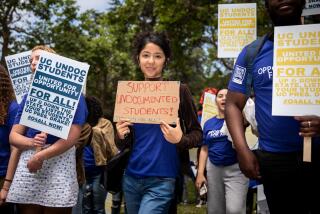Quaker Group Files Suit for Exemption From Law Against Hiring Illegal Aliens
- Share via
The American Friends Service Committee, citing its 70 years of work for the downtrodden, on Tuesday went to court to claim that it should be exempt from civil and criminal sanctions that face employers who knowingly hire undocumented workers.
The religious organization’s lawsuit, filed in federal court in Los Angeles, asks that the group be freed from complying with the Immigration Reform and Control Act of 1986 because it illegally requires the group to compromise its religious tenets. The challenge goes beyond the position taken by the nation’s Catholic bishops, who have staunchly criticized the law and pledged to seek legislation to rewrite parts of it, but have not challenged it in the courts.
Stephen G. Cary, national chairman of the American Friends Service Committee, said it is morally untenable for the pacifist group to refuse employment to some of the very people whose rights it champions. The organization currently is not complying with the law, he added.
Created by Quakers
The group, a social action committee created in 1917 by members of the Religious Society of Friends but independent of the Quaker church itself, is headquartered in Philadelphia and employs about 450 people to staff charitable, social, philanthropic and relief work around the world. In 1947, the organization shared the Nobel Peace Prize with the British Friends Service Council for its humanitarian efforts to aid the victims and refugees of war.
“Under the employer sanction provisions of the act, we must act as the government’s agent in denying employment to a whole class of people and driving them underground, opening them to ruthless exploitation by the unscrupulous,” Cary said. “We find ourselves ordered by the government to cast out the very people we’ve been seeking so long to help.”
The 1986 federal legislation requires employers to determine whether their non-citizen job seekers are authorized to work in the United States and not to hire those who are unable or unwilling to produce such documentation. The Immigration and Naturalization Service is empowered to seek criminal penalties against employers who hire illegal aliens, and to levy fines of up to $2,000 for each illegal worker on an employer’s payroll. More than 720 employers nationwide have been fined to date.
Tuesday’s lawsuit, which names U.S. Atty. Gen. Richard L. Thornburgh and the INS as defendants, is not the first to cite objections to the law based on religious convictions.
INS Won in Court
Verne Jervis, an agency spokesman, said a lone employer had sued the agency on the grounds that his religion prohibited him from asking and recording the citizenship information about employees that the law requires. The INS prevailed in court, Jervis said.
Harold Ezell, western regional commissioner for the INS, said he was unsympathetic with the lawsuit’s motives and goals.
“I can’t imagine the conscientious objector concept being any kind of a valid reason to disobey the law,” Ezell said. “The law says everybody, whether you’re Quaker, Catholic or a member of the Jewish faith, has to comply.”
He characterized the lawsuit as “another way to try to resurrect the dying sanctuary movement. This is a typical twist that the sanctuary people would use. It’s clever, but I don’t think it’s anything I’m concerned about.”
Cary said the AFSC had grown increasingly troubled by the law over the past year and finally decided to challenge it in court. He said he assumes various AFSC offices around the nation hire undocumented workers to assist in its programs and projects, especially along the U.S.-Mexican border. The AFSC has not asked prospective employees to show proof that they are documented “and a lot of the staff has said they would not provide us documentation, on moral grounds, if we did ask,” Cary said.
While the AFSC hasn’t had so much as a warning from the INS that it faces sanctions for hiring illegal aliens, “we’re aware we’re vulnerable, and this would release us from a burden,” he said.
Nor would a successful lawsuit likely have much effect on other employers who hire undocumented aliens, unless they too could claim conscientious objection to the law on religious grounds, Cary said.
More than a dozen other organizations and churches have petitioned the court to file supporting briefs, including the Southern California Ecumenical Council and the National Assembly of Religious Women.
Thursday’s lawsuit is the second time the AFSC has confronted the federal government in court over employment issues. In the early 1970s, the organization sued on behalf of its employees who objected to the withholding of federal payroll taxes that they believed were helping to finance the war in Vietnam.
The lawsuit prevailed at the district court level but was overturned at the appellate level, Cary said.
Founded During World War I
The principle of conscientious objection goes to the very roots of the AFSC. The organization was founded by American Quakers to provide conscientious objectors to World War I with alternative civilian service in programs of relief and reconstruction.
Last Thursday the nation’s Roman Catholic bishops committed their church to stepping up its opposition to the law’s provisions for employer sanctions but stopped short of advocating that employers break the law by hiring illegal aliens.
In their statement, the U.S. bishops said they will work to change the immigration reform act in order to extend legal status to illegal aliens who arrived after the Jan. 1, 1982, cutoff date and thus were ineligible for amnesty.
More to Read
Sign up for Essential California
The most important California stories and recommendations in your inbox every morning.
You may occasionally receive promotional content from the Los Angeles Times.










